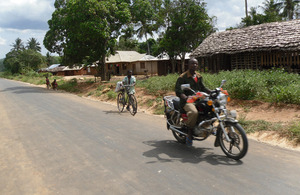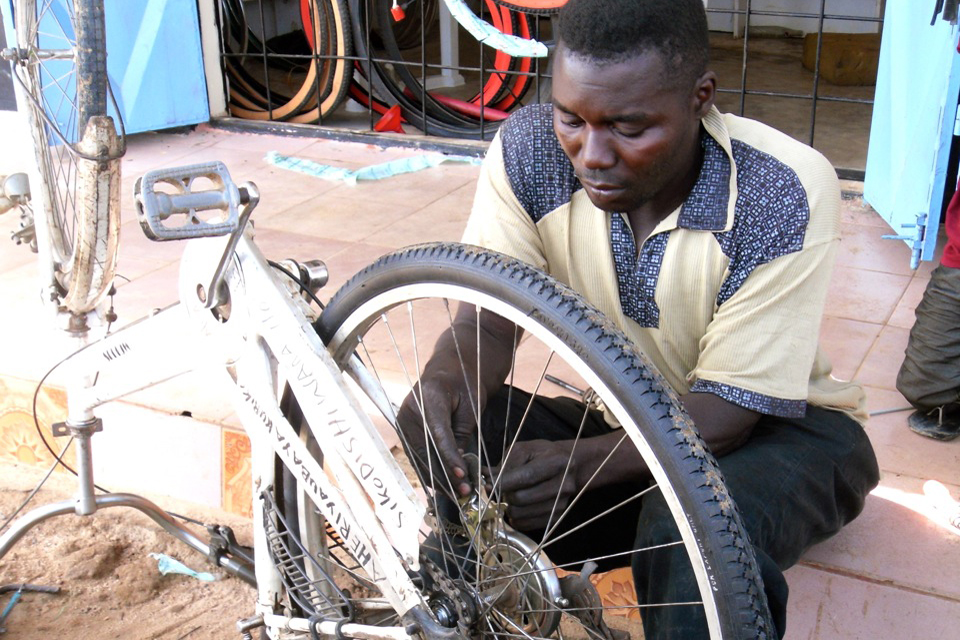New road leads to happier communities in eastern Tanzania
How a new road built with British support is creating business opportunities and improved access to healthcare

Section of the upgraded road. Picture: AFCAP/Crown Agents
Every month, 35-year-old Asha Faraha takes her 14-month-old baby, Subira Ibrahim, to visit the medical dispensary in the nearest town, Talawanda. Until recently, she had to make the 10 km journey by foot but, since the road between her village and Talawanda was improved, Asha can get to the health centre in just ten minutes.
The Bago to Talawanda road is one of 200,000 km of rural roads in Africa that are being upgraded with the support of the African Community Access Programme (AFCAP). The programme, funded by UK aid and managed by Crown Agents, is helping to build or improve 200,000 km of rural roads in Africa, enabling millions more people to access vital services and boost their livelihoods through trade.
“Before the new road was constructed, there were many problems. The road was very bad,” says Mwajuma Haji Athumania, who lost her baby after heavy rains made the old road impassible, and she could not reach the health centre in time. “The doctor suggested that, if the roads were better, children wouldn’t die.”
Only 15% of roads in sub-Saharan Africa are paved or usable in all weather. The lack of decent road infrastructure is one reason why millions of women give birth each year without skilled care.
“Before the road was improved, we just used natural medicines to treat the sick,” says Saidi Dibwe, Chairman of Talawanda West Village. “But now they can get to hospital by car or motorbike taxi, whatever the weather.”
Business is booming
The improved road from Bago to Talawanda has not only transformed access to vital health services, the local community is also benefitting from the economic opportunities that greater access to other markets has brought.

Imani Ali at work in his bike shop. Picture: AFCAP/Crown Agents
Ali, a 33-year-old entrepreneur, was quick to spot a business opportunity when work on the new road started. He used the money he had saved from his pineapple farm to open a bike shop where the road begins, renting bikes to the local community and selling spare parts.
“Before, if it was raining, people didn’t go anywhere,” he explains. “If you had a bike you just left it and went on foot, but now people use their bicycles every day and more people are coming past the shop.”
The new road has transformed Imani’s life for the better. He can now transport his pineapples more quickly to market, make a good living from his bike business and see more of his family - the journey home in the rain, which used to take 3 hours, now takes just half an hour.
“I will use the money I’ve made to open more businesses like this one!” he says.
Improving road safety
The Bago to Talawanda road has improved lives and livelihoods, but there is a downside - rural communities are not used to dealing with increased traffic volume and speeds.
Habibu Milaji lost 2 of his front teeth in a bodaboda accident shortly after the road was completed. “A van came round a sharp corner at around 60 km/h and the motorbike I was on hit some stones, swerved and crashed,” he recalls.
It is estimated that 1.3 million people will die in road accidents this year, and 50 million more are injured. The vast majority of these deaths and injuries take place in developing countries.
AFCAP is supporting research into the impact that roads, such as the new Bago to Talawanda road, have on communities and helping to provide road safety training for pedestrians and drivers.
As part of the UN’s Decade of Action for Road Safety, announced in 2010, DFID is working with a range of partners to ensure road safety is integrated into all phases of its road infrastructure work. Achieving the UN’s target of reducing the number of forecasted deaths in road accidents by 50% will save five million lives and prevent 50 million injuries by 2020.